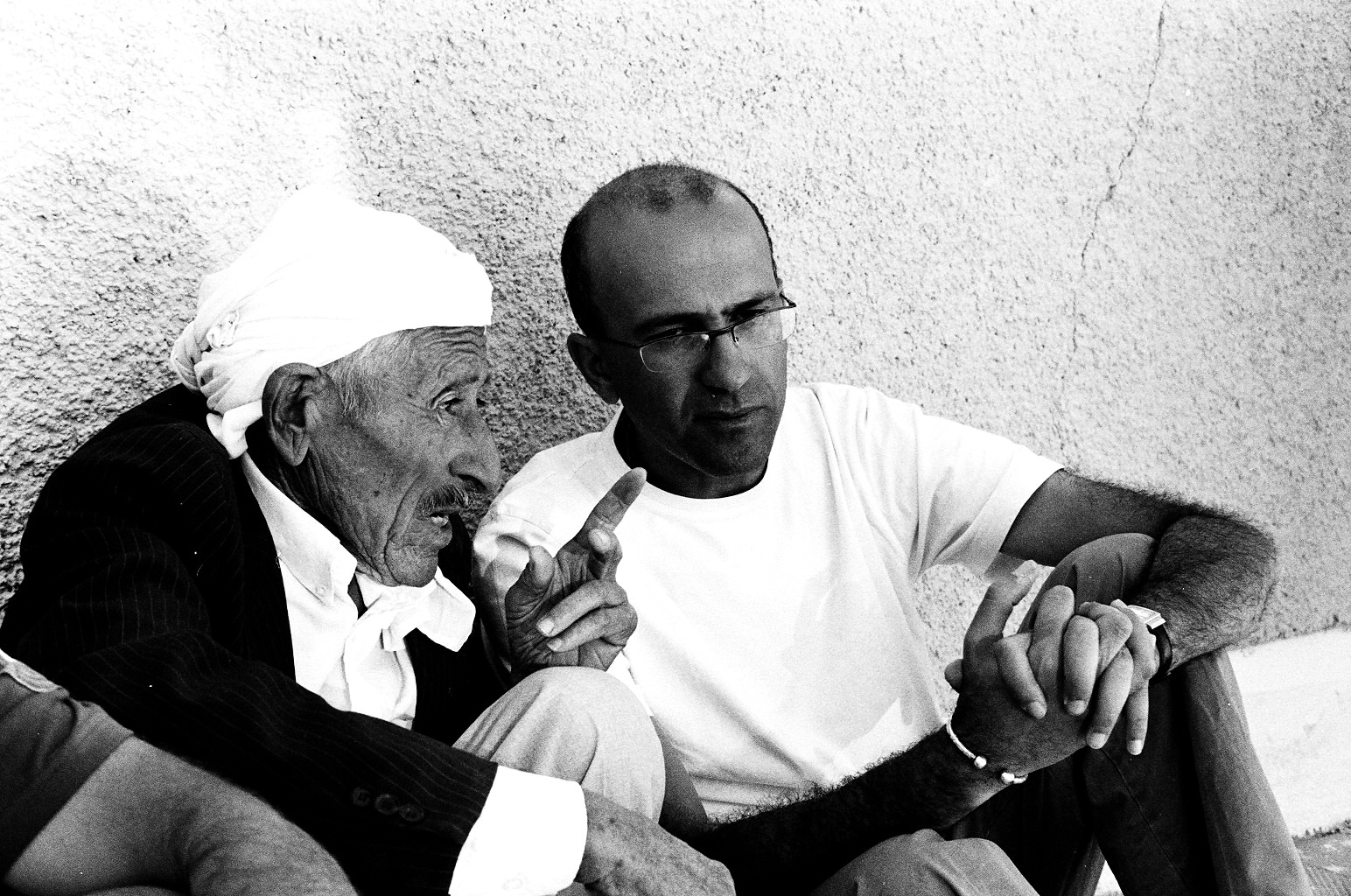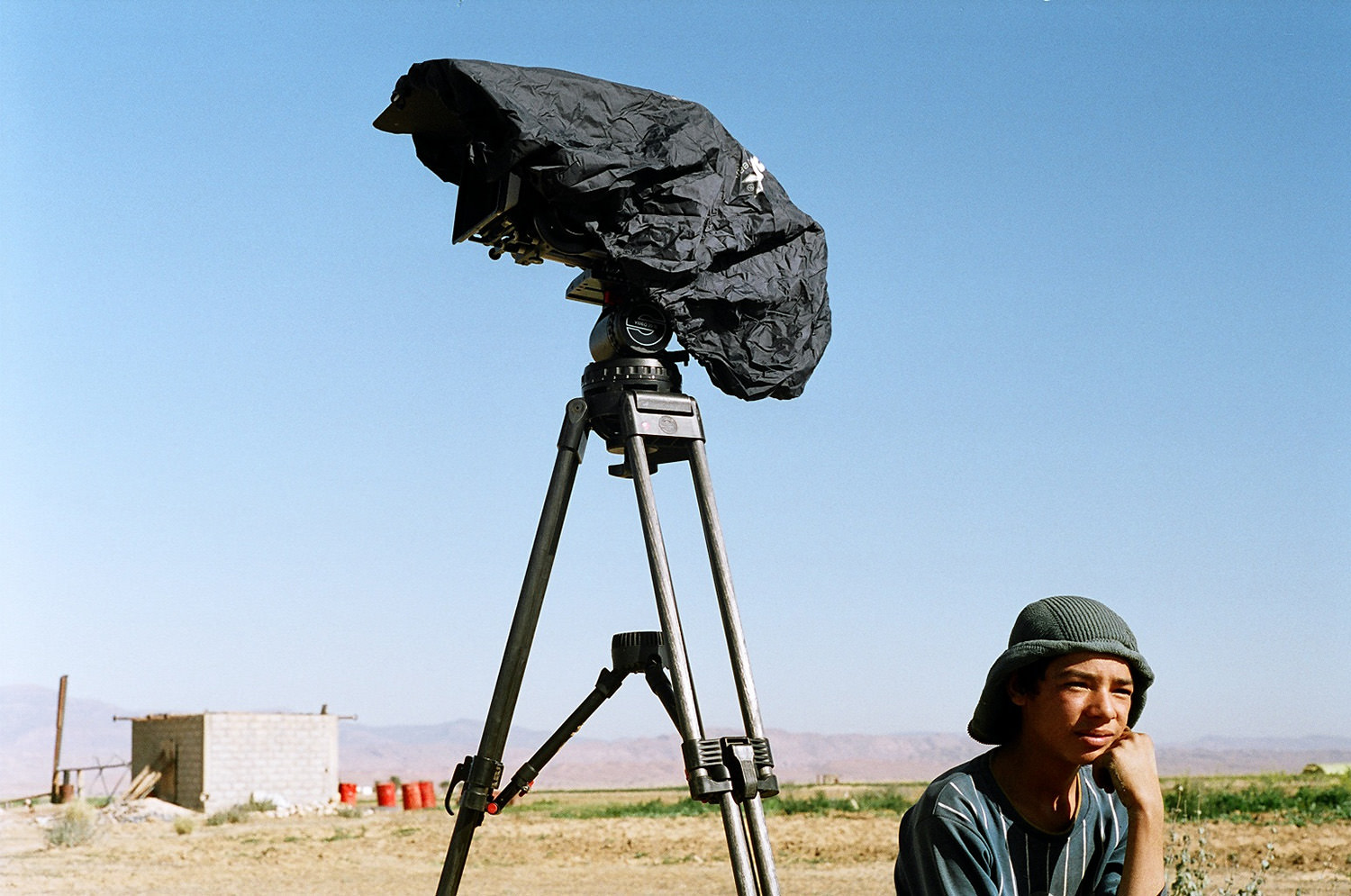Malek Bensmaïl est né à Constantine (Algérie) en 1966. Très tôt il a tourné des films en Super 8. Depuis ses études en cinéma à Paris et sa formation aux studios Lenfilm à Saint-Pétersbourg, il s’est consacré au cinéma du réel.
Tous ses films sont liés à l’histoire de son pays. Son style cinématographique dessine les contours complexes et sensibles de l’humanité. Pour le réalisateur, le cinéma est avant tout un moyen au service de la réflexion et des échanges culturels. Applaudis par la critique, ses films ont reçu des prix dans de nombreux festivals autour du monde.
En 2010, il est Lauréat de la Villa Kujuyama (Villa Médecis Asie) à Kyôto pour son projet de long métrage Odysseys.
En 2020, Malek Bensmaïl est nommé membre de l’Académie des Oscars.
Master Class Apt with Olivier Barlet
 Jean-Philippe Tessé des Cahiers du Cinéma questionne le cinéaste sur ses influences, sa pratique de mise en scène et de montage, son rapport au militantisme, ses désirs de cinéma, et le portrait de l’Algérie contemporaine qu’il dresse dans son travail.
Jean-Philippe Tessé des Cahiers du Cinéma questionne le cinéaste sur ses influences, sa pratique de mise en scène et de montage, son rapport au militantisme, ses désirs de cinéma, et le portrait de l’Algérie contemporaine qu’il dresse dans son travail.La Bataille d’Alger, un film dans l’Histoire. En 2017, Malek signe un nouveau long-métrage documentaire sur le film de Pontecorvo, La Bataille d’Alger réalisé en 1965 qui a obtenu un Lion d’Or à Venise en 1966. Un retour sur ce film mythique avec des témoignages et archives exceptionnelles. Ce film est distribué par la société américaine Journeyfilms.
En 2015 est sorti sur les écrans Contre-Pouvoirs, un long métrage sur le célèbre quotidien El Watan, filmé durant la présidentielle 2014. Un hommage au travail des journalistes algériens.
Malek Bensmaïl eu l’honneur d’être en résidence à la Villa Kujoyama pour son projet Odysseys.
Son dernier long-métrage, La Chine est encore loin (2010) a remporté le Grand Prix du Dokfilmfestival de Munich et le Prix du Jury au Festival des 3 Continents. Aliénations (2004) lui avait valu le Library Award au Festival du Cinéma du Réel et le Prix Magnolia au Festival de Shanghaï et de nombreux prix à travers le monde.
Malek Bensmaïl signe en 2013 pour « Marseille, Capitale Culturelle Européenne », un film/installation, Ulysse, le brûleur de frontières et la mer blanche du milieu.
En 2010, La Chine est encore loin, chronique située dans les Aurès et traitant de la transmission des savoirs en Algérie 50 ans après l’Indépendance, sort sur les écrans français et algériens.
Guerres secrètes du FLN en France (2012) revient sur l’histoire peu connue du combat mené par le FLN sur le territoire français lors de la guerre d’Indépendance.
En 2005, Le Grand Jeu, censuré en France et interdit d’antenne en France et en Algérie, interroge la complexité d’une démocratie balbutiante en étudiant la fabrication d’un homme politique « d’opposition » lors de la dernière campagne présidentielle algérienne.
Dans Aliénations (2004), il suit médecins et malades dans le service de psychiatrie de Constantine, sa ville natale, et tente modestement de comprendre les souffrances que peuvent vivre aujourd’hui les algériens.
Algérie(s) (2002) est une longue enquête menée avec Thierry Leclère sur la décennie sanglante en Algérie.
En 2001, Plaisirs d’eau, pour se purifier de tous les maux de son pays, il réalise un film sur le rapport de l’Homme avec les bains à travers le monde: de Tokyo à Budapest, et d’Istanbul à Helsinki.
Boudiaf, un espoir assassiné (1999), un documentaire sur le président algérien assassiné en direct à la télévision, six mois après son retour d’un exil de trente ans. Un film qui donnera matière à une fiction courte, Demôkratia (2000), fable philosophique sur la machinerie du pouvoir absolu dans un pays totalitaire imaginaire.
Des vacances malgré tout… (2001), tourné avec une famille émigrée hors du commun, décrit la rencontre difficile entre ceux qui ont émigré et ceux qui sont restés au pays.
DéciBled, l’année 1998 est consacrée à un film musical qui dresse un portrait de cinq musiciens algériens en exil, derrière l’arbre Raï qui cache la forêt.
Algerian TV Show (1997), un court métrage pour Canal+. Télévision, paraboles et autodérision dans le quotidien difficile des algériens.
Territoire(s) (1996), confrontant images d’archives, extraits de films de propagande, de fictions, et images documentaires, met en perspective les violences archaïques en Algérie et dans le Monde arabe et les violences post-modernes et médiatiques en Occident.
Les films du cinéaste ont été diffusés à travers les chaines de télévisions du monde : France 2, France 3, France 5, Arte, M6, Canal+, La Chaine Histoire, RTBF, VRT Belgique, BBC, Chanel 4 UK, Kuntskannal et SBS Pays-Bas, YLE Finlande, El Arabia, SBS Australie, TRT Turquie, 2M Maroc, TV 3 Espagne, RTS Suisse, Universciné…

English Bio-filmo
Malek Bensmaïl was born in Constantine, Algeria in 1966. Early in his youth, he shot films in Super 8. Since completing his film studies in Paris and training at Lenfilm studios in Saint Petersburg, he has devoted his filmmaking efforts to the documentary genre. All of his films relate to the history of his country.
His signature cinematography depicts the complex, sensitive contours of humanity. His aim is to use film as a medium for cultural reflection and comparison.
His films have received critical acclaim and have won awards at a number of festivals worldwide.
In 2010, he is laureate of the Villa Kujuyama (Villa Médecis Asia) in Kyôto for his feature film project Odysseys.
In 2020, Malek Bensmaïl is nominated member of the Oscars Academy.
The Battle of Algiers, a film within History. In 2017, Malek signs a new feature-length documentary on Pontecorvo’s film The Battle of Algiers, directed in 1965, which won a Golden Lion in Venice in 1966. A return on this mythical film with exceptional testimonies and archives. This film is distributed by the American company Journeyfilms.
In 2015, Malek Bensmail signed CONTRE-POUVOIRS (CHECKS & BALANCES). He set up his camera in the newsroom of the famous daily paper El Watan, the spearhead of the Algerian independent press to film the procedures and thought processes behind journalism during the last presidential election.
In 2013, he directed a movie and the installation for Marseille capitale culturelle: ULYSSE, « the burner borders and the white middle sea ». The director Malek Bensmaïl has designed a Ulysse today, a Ulysses « burner borders », went to meet his contemporaries. This man « out of nowhere, at home everywhere » is to listen to those he meets when docked in a port of Mediterraneans.
Malek Bensmaïl directed in 2012 SECRET WAR OF THE FLN IN FRANCE, a documentary for France 2 and RTBF.
In 2010, his latest feature-length documentary, CHINA IS STILL FAR, will be released in French and European movie theatres. The film focuses on childhood and knowledge transfer in Algeria, 50 years after independence. It is a chronicle filmed throughout the changing seasons of a village, Aurès, the “cradle of the Algerian Revolution”. The film is in line with his previous work and his memories of the decolonization that began over ten years earlier. This film won THE BEST DOCUMENTARY PRIZE IN 9TH DIGITAL FESTIVAL IN PARIS, THE SPECIAL JURY PRIZE IN THE 3 CONTINENTS FESTIVAL IN NANTES, and BEST AWARD IN DOK FEST IN MUNICH.
As the summer of 2003 flies by, he directs an urgent film, ALIENATIONS, a film that pays homage to his father, a psychiatrist. By following doctors and patients at the psychiatric service in Constantine, where he was born, he modestly attempts to understand the suffering with which Algerians live, confronted by many ideas: religious, political, economical, and familial. The film won many prizes, including the “GRAND PRIX DES BIBLIOTHÈQUES” IN THE FESTIVAL DU CINÉMA DU RÉEL IN PARIS and THE MAGNOLIA AWARD FOR THE BET DOCUMENTARY AT THE INTERNATIONAL FESTIVAL OF SHANGAÏ.
ALGERIA’S BLOODY YEARS, in 2002, is a long and passionate quest, led with Thierry Leclère, to document a bloody decade in Algeria, and filmed in two 80-minutes sections. It is shown in many places around the world and receives a number of prizes.
THE BATHS OF THIS FLOATING WORLD, is a film that seems like a necessary purification after the violence of obsessively questioning human tragedies in his previous work. This is where the idea of collective and public bathing came from. It is a first encounter with Japan, an idea and a compulsion that he proposes for the Villa Kujoyama, Kyoto, for the year 2009.
In 1994, he directs TERRITORIE(S), a 30-minutes film based on a creative montage combining archival images, excerpts from propaganda films and fiction, and filmed images. The film is a very personal look that overlaps a discourse that puts into perspective the archaic violence in Algeria and the Arab world on the one hand, and the post-modern violence of the West on the other. THIS FILM WON “BEST DOCUMENTARY DISCOVERY” AT THE FESTIVAL OF NEW CINEMA IN MONTREAl.
In 1998, at the request of France Institut National de l’Audiovisuel and the network Arte, he co-directs a political documentary, BOUDIAF, AN ASSASSINATED HOPE on the Algerian president who was assassinated live on television, six months after his return from a 30-years exile.
This film provides the material for a short fiction, DÊMOKRATIA, which shows on Arte in 2002. DÊMOKRATIA is a philosophical fable about the machinery of absolute power in an imaginary totalitarian country. The approach taken strictly was to maintain a light oscillating between reality and fiction.
Again in 2001, he wins the “PRIX DU PATRIMOINE” AT THE FESTIVAL DU CINÉMA DU RÉEL IN PARIS for a documentary, DES VACANCES MALGRÉ TOUT (HOLIDAYS DESPITE ALL). Featuring an out-of-the-ordinary emigrant family, the film shows a difficult encounter between those who have emigrated and those who have remained in their country.
